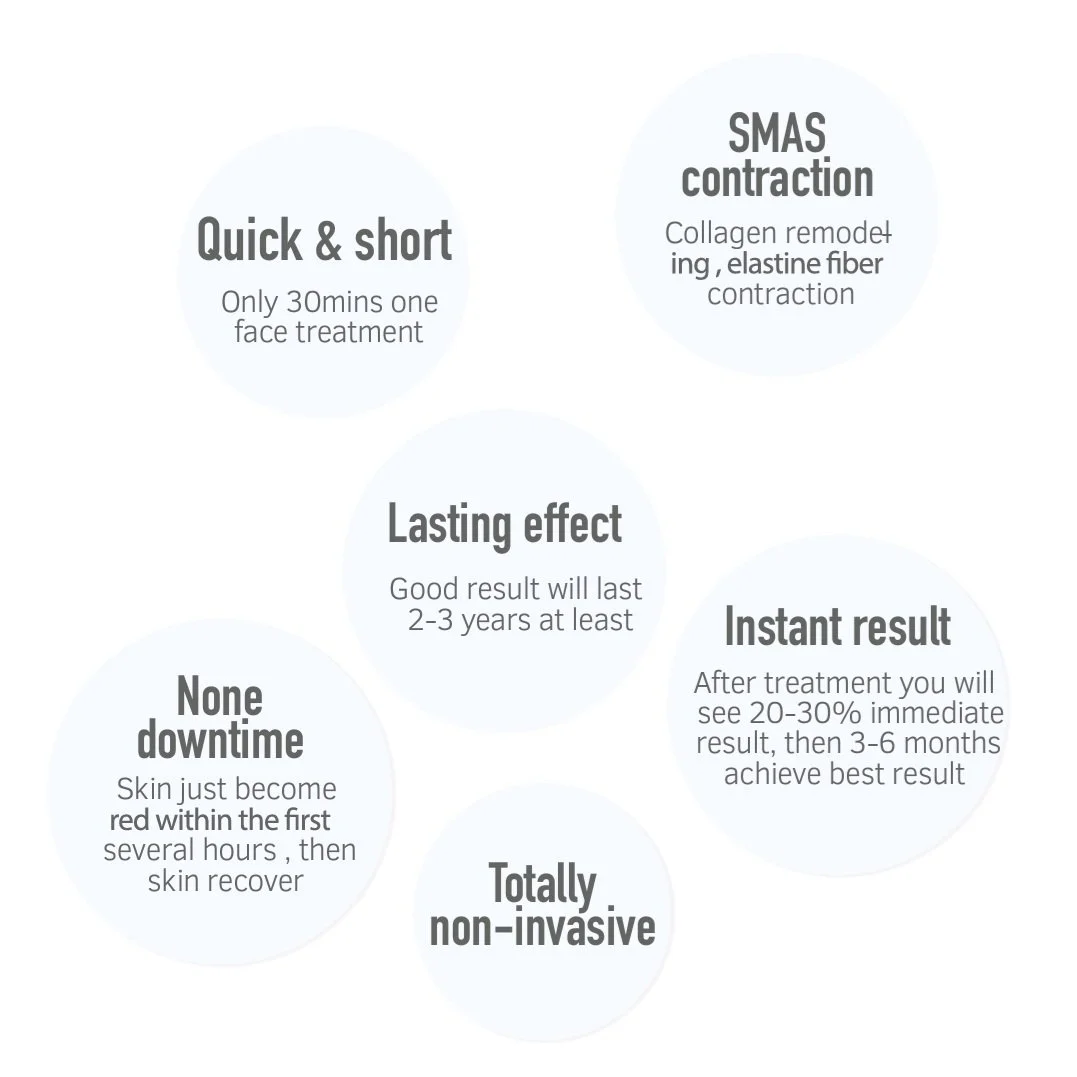
HIFU - Non Surgical Skin Tightening & Contouring
HIFU is considered a safe, effective, and noninvasive procedure for tightening facial skin. Its advantages over a surgical facelift are hard to deny.
There are no incisions, no scarring, and no required rest or recovery time. HIFU is also far less expensive than a facelift.
High-intensity focused ultrasound (HIFU) is a relatively new cosmetic treatment for skin tightening that some consider a noninvasive and painless replacement for facelifts. It uses ultrasound energy to encourage the production of collagen, which results in firmer skin.
This method not only enhances the skin's elasticity but also addresses concerns such as fine lines and sagging, making it a popular choice for those seeking a rejuvenated appearance without the risks associated with surgical interventions. As more individuals prioritize noninvasive options, HIFU stands out as an innovative solution for achieving youthful, revitalized skin.
The procedure can firm sagging skin, smooth wrinkles, and improve skin texture. With good aftercare, the benefits of a HIFU facial can last for about 1 year. While the procedure is also used for overall facial rejuvenation, lifting, tightening, and body contouring, HIFU uses focused ultrasound energy to target the layers of skin just below the surface. The ultrasound energy causes the tissue to heat up rapidly. Most people see full results three months after their final treatment.
Benefits
Tightening Sagging Skin: Effectively lifts and tightens sagging skin on the neck, often referred to as turkey neck.
Lifting Features: Enhances the cheeks, eyebrows, and eyelids for a more youthful look.
Jawline Definition: Improves the definition of the jawline, creating a more contoured profile.
Décolletage Tightening: Addresses skin laxity in the décolletage area for a firmer appearance.
Skin Smoothing: Leaves the skin looking smoother and more polished.
Wrinkle Reduction: Significantly minimizes fine lines and wrinkles for a smoother appearance.

Contraindications:
1. Patients with malignant tumor
2. Pregnant or breastfeeding women
3. Those with active herpes
4. Patients with epilepsy
5. Patients with any infection
6. Patients with inflammatory responses
7. Patients with bleeding disorders, such as Haemophilia
8. Patients with cardiovascular disorders
9. Patients with kidney disorders
10. Patients using cardiac pacemakers
11. Patients with inserted metal stents
12. Patients with blood pressure issues
13. Patients with diabetes
14. Patients with skin disorders or rashes
15. Patients undergoing anti-coagulant treatment or taking anti-coagulant medication
16. Patients with autoimmune disorders
17. Patients with facial paralysis
18. Patients with lupus, vitiligo, melasma or albinism
19. Patients with high fever
20. Patients with fillers in the area
21. Keloid-type skin
22. Patients who are sensitive to electrical stimulation
23. Patients with other specific conditions
24. Patients with implants (including dental, cosmetic, or orthopedic)
25.Pacemakers and other implantable electronic medical devices
26. A life-prolonging device such as an artificial heart or artificial lung
27. A portable electronic medical device such as an electrocardiograph
After care instructions:
Exfoliation or scrub for a week to prevent further irritation to your skin. As you may have guessed, more inflammation will not help your healing process.
2. Do not consume alcohol, smoke, or visit the sauna. Please avoid consuming alcohol, smoking or visiting the sauna to prevent any skin inflammation after the procedure.
3. Do not use ice packs on your skin.
4. Moisturize your skin very well. As your skin may get very dry after the HIFU treatment, we recommend using products with hydrating ingredients. If you are using skincare products made for skin brightening or anti-aging, we advise you to stop using those for the first two weeks post-procedure. Instead, you can replace with gentle and mild products made for skin moisturization, hydration and soothing.
5. Drink plenty of water. Remember to hydrate not only your skin, but also your body! Also, having enough rest helps in the skin recovery process.
6. Avoid sun exposure.
7. Avoid hot bath.
8. Avoid spicy food.
9. Take Vitamin C and collagen supplements. Did you know that Vitamin C helps in skin regeneration? Collagen supplements can also be a great way to take better care of your skin and body.
You can use a gentle and cooling sheet mask at room temperature to calm your skin, specifically one that is good for hydrating, soothing and cooling your skin.
NOTE: You can feel the tenderness on the treated area, it is normal it will go away with in 2 weeks.
Teatment Plan:
HIFU Treatments are designed to enhance skin firmness and elasticity. Typically, two to three treatments are recommended in a year to maintain optimal results. The third treatment, while beneficial, is specifically suggested for individuals experiencing significant sagging. By spacing these treatments throughout the year, clients can effectively combat skin aging and maintain a rejuvenated appearance.





